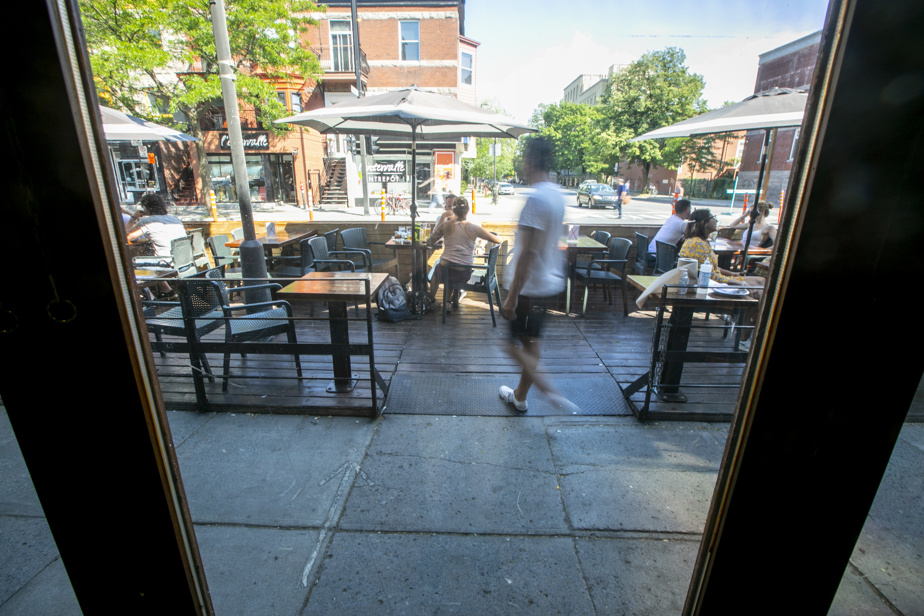
(Montreal) Quebec bar owners do not understand why a public health rule prohibits the sale of alcohol after midnight when the epidemiological situation is under control. According to them, this can be detrimental to the business and cause some customers to overindulge.
Ziggy Eichenbaum, owner of Ziggy’s Pub in downtown Montreal, protested, “It doesn’t make perfect sense.”
According to its statistics, the “last call” at midnight, rather than 3 am, causes the evening to lose 50% to 60% of its turnover. Mr Eichenbaum argued that these limited business hours were unreasonable as other provinces, including Ontario, allowed bars to operate during the COVID-19 pre-pandemic opening hours.
“The Prime Minister seems to think that the Quebecs do not know how to drink,” Mr Eichenbaum said. This is true in all but Canada, except in Quebec. ”
According to public health guidelines, bars and clubs are required to close at 2 a.m., but liquor sales must be well past midnight. In addition, all customers must sit and dance is prohibited.
Pierre Thibault, president of the New Association of Quebec Bars, said in an interview Tuesday that he was concerned about the future of Montreal nightclubs, many of which are still closed. He said that although the situation was depressing for many bars, many survived on liquor sales between noon and midnight.
In the case of nightclubs, this is a completely different story, because they cannot provide the experience their customers are looking for because of the ban on dancing.
“People who loved their club, they came for a week or two, but they will not come back because it’s not a club anymore,” Mr Thibault said. According to him, those who really want to dance can find other places, including private parties.
The owner of Club Unity in the Village, Matthew Drape, is lucky enough to be able to count on his rooftop. The only place he founded was when he opened it to customers.
Mr Drape said he was trying to adjust the new rules by opening earlier, but had to invest his money in advertising to attract customers on the weekends, which could not sustain his business. He fears that if the rules do not change in the fall, he will have to leave the business.
Matthew Drape said he heard his clients discussing private parties when he left his establishment.
“In my opinion it is very good to keep people with fresh air on my roof terrace,” he says, adding that customers have to stay in their places. This is unlikely to happen in a crowded house or apartment.
For his part, Renaud Pauline, president and general manager of Quebec’s Bars, Breweries and Barbers Owners Corporation, announced that his company, Franంois Legalt, was preparing to write to the government to find out when sanctions would be imposed on bars. Canceled. Its members are seeking explanations to justify continuing the ban on the sale of alcohol after midnight.
Reynold Pauline believes the rule encourages some customers to order unreasonable alcohol before midnight. A problematic condition that leads to overuse.
Ziggy Eichenbaum noticed a similar thing in his establishment. His clients try to drink as many drinks as possible before leaving.
“From a quarter of an hour until midnight, from ten to ten, people order 15 to 20” shooters “and five pitchers of beer,” he said, giving an example, saying he had turned down these exaggerated requests.
The employer hopes that the final service will return to its normal time before Canada opens its tour to American tourists in August.
“With the return of tourists to Montreal, Premier Franకోois Legalt finds out that Montreal is famous for its nightlife. If he wants to kill Montreal, he’s doing a very good job,” he stressed.
The Department of Health did not respond to our requests to comment on Tuesday. Quebec reports 76 new cases of COVID-19 in its daily report and no new deaths unrelated to coronavirus.
This article was created with the financial support of Facebook and The Canadian Press News Scholarships.






More Stories
Sportswear: Lolle acquires Louis Garneau Sports
REM is still innovative enough to foot the bill
A trip to the restaurant with no regrets for these customers